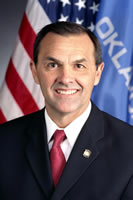In order to provide equal access and equal opportunity to people with diverse abilities, this site has been designed with accessibility in mind. Click here to view
Senator Raises Concerns About Expanded Special Session Call
 Senator Randy Brogdon
Senator Randy Brogdon
State Sen. Randy Brogdon said he had serious concerns that one item on the Governor’s expanded special session call could waste millions of taxpayer dollars. Specifically, the Owasso Republican questioned the second item of the amended call which asked lawmakers to consider funding for the Oklahoma Capitol Complex.
“I’m very concerned that this could end up being a push to replace the Capitol’s heating and cooling system—something that could cost $27 million. As someone who has been in the air conditioning business for 30 years, I can tell you this would be a waste of the public’s money,” Brogdon said.
Brogdon said he was concerned that there had not been any kind of competitive bidding process. He said the proposal that’s been discussed at the Capitol went through the Oklahoma Department of Central Services purchasing division.
“I think taxpayers ought to be very concerned that DCS would authorize a report to be conducted by the same company that will automatically receive a $27 million contact. We need to have an objective third party do a study—one that has no interest in receiving the contract award,” Brogdon said.
Brogdon said that Flint & Kallenberger Consulting Engineers had submitted a proposal to do a study on the air conditioning system in 2004. Their study recommended keeping the current geo-thermal system and make necessary upgrades and modifications at a cost of $11 million.
That same year Johnson Controls offered a study with recommended eliminating the geo exchange system and replacing it with a central unit. Their projected cost was $27 million.
“Oklahoma has been a pioneer in the geo-thermal industry. These are systems that are less expensive to operate and more energy efficient than any other and yet it seems we’re on the verge of scrapping the Capitol’s system at a cost that is more than twice what it would be to simply upgrade the existing one,” Brogdon said. “That would be devastating to this Oklahoma-based technology as well as a huge waste of the public’s money.”
 Oklahoma Senate
Oklahoma Senate

